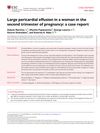 December 2004 in “Medicine”
December 2004 in “Medicine” Pregnancy can cause skin changes and may affect pre-existing skin conditions, with some treatments not safe for use during pregnancy.
[object Object]  16 citations,
March 2008 in “Dermatologic Surgery”
16 citations,
March 2008 in “Dermatologic Surgery” Hydrogen peroxide's effects on wound healing in hair transplants are unclear, and it may slow healing and increase scarring.
 June 2008 in “Dermatologic Surgery”
June 2008 in “Dermatologic Surgery” Hydrogen peroxide may have both positive and negative effects on wound healing, and its safe concentration for hair transplant surgery is unclear.
 5 citations,
February 2011 in “General and Comparative Endocrinology”
5 citations,
February 2011 in “General and Comparative Endocrinology” Flutamide and finasteride reduced sex hormones in pregnant hyenas, but increased them in males.
1 citations,
December 2021 in “American Journal of Obstetrics and Gynecology” Hair cortisol levels peak in the third trimester and decline postpartum.
 February 2024 in “European heart journal. Case reports”
February 2024 in “European heart journal. Case reports” Early surgical intervention and a multidisciplinary approach are crucial for managing complex cardio-obstetric patients.
 August 2022 in “IntechOpen eBooks”
August 2022 in “IntechOpen eBooks” Congenital Adrenal Hyperplasia is a rare inherited disease causing hormone imbalances, affecting growth, fertility, and heart health, diagnosed through blood tests and treated with medication and lifestyle changes.
 2 citations,
January 2019 in “Indian Dermatology Online Journal”
2 citations,
January 2019 in “Indian Dermatology Online Journal” The congress concluded that misuse of antifungal drugs in South Asia has led to widespread treatment failure, and new approaches and regional cooperation are needed.
 75 citations,
October 1996 in “Dermatologic Clinics”
75 citations,
October 1996 in “Dermatologic Clinics” Chronic Telogen Effluvium is a hair loss condition in middle-aged women that usually doesn't lead to complete baldness.
 6 citations,
September 1990 in “International Journal of Gynecology & Obstetrics”
6 citations,
September 1990 in “International Journal of Gynecology & Obstetrics” The skin condition PUPP usually gets better on its own after giving birth and is unlikely to happen again in future pregnancies.
 29 citations,
November 2011 in “Veterinary pathology”
29 citations,
November 2011 in “Veterinary pathology” The study found that mouse sweat glands develop before birth, mature after birth, and have specific keratin patterns.
 1 citations,
May 2021 in “BMC Proceedings”
1 citations,
May 2021 in “BMC Proceedings” The document concludes that more research is needed to reduce frequent hospital visits, addiction medicine education improves with specific training, early breast cancer surgery findings are emerging, nipple smears are not very accurate, surgery for older melanoma patients doesn't extend life, a genetic condition in infants can often be treated with one drug, doctors are inconsistent with blood clot medication, a certain gene may protect against cell damage, muscle gene overexpression affects many other genes, and some mitochondrial genes are less active in mice with tumors.
 July 2022 in “Research Square (Research Square)”
July 2022 in “Research Square (Research Square)” Hair analysis can somewhat track past testosterone levels but is influenced by factors like hair washing, growth rate, sex, and hair color.
18 citations,
September 2021 in “Journal of Neuroendocrinology” Neurosteroids can influence behavior by modulating brain inhibition, with potential for treating psychiatric disorders.
 28 citations,
August 2009 in “Nursing for Women's Health”
28 citations,
August 2009 in “Nursing for Women's Health” Cognitive behavioral strategies help women with PCOS make lifestyle changes to improve their health.
9 citations,
April 2018 in “Biology of reproduction” Diet changes hormone levels in pregnant ewes by affecting metabolism, not placental synthesis.
 12 citations,
May 1989 in “Postgraduate Medicine”
12 citations,
May 1989 in “Postgraduate Medicine” The document concludes that hair loss is common and can be treated with medications like minoxidil or surgical options, and it significantly affects people's psychological well-being.
 22 citations,
March 2019 in “Environmental health”
22 citations,
March 2019 in “Environmental health” Higher fluoride levels may delay puberty in boys.
 19 citations,
November 2021 in “Reviews in endocrine and metabolic disorders”
19 citations,
November 2021 in “Reviews in endocrine and metabolic disorders” Sex hormones like estrogen and testosterone may affect COVID-19 severity differently in men and women, potentially influencing prevention and treatment strategies.
 January 2019 in “ARC journal of pharmaceutical sciences”
January 2019 in “ARC journal of pharmaceutical sciences” Acne can be managed with various treatments and requires psychological support due to its emotional impact.
 192 citations,
March 2017 in “Cell host & microbe”
192 citations,
March 2017 in “Cell host & microbe” Hair follicle development and microbes help regulatory T cells gather in newborn skin.
1 citations,
January 2023 in “Journal of Obstetrics and Gynaecology” High DHEA and short cervical length in women with PCOS and recurrent miscarriages may harm pregnancy outcomes.
 3 citations,
January 2019 in “Elsevier eBooks”
3 citations,
January 2019 in “Elsevier eBooks” Pharmacists should interpret lab data and perform physical exams to improve patient care.
 6 citations,
January 2016 in “Annals of Dermatology”
6 citations,
January 2016 in “Annals of Dermatology” Human hair contains more glycosaminoglycans in children than adults, and these compounds decrease with age, possibly affecting hair thickness.
 30 citations,
January 2023 in “EFSA journal”
30 citations,
January 2023 in “EFSA journal” Adults should not consume more than 255 micrograms of selenium per day to avoid risk of hair loss and other side effects.
 January 2023 in “Our Dermatology Online”
January 2023 in “Our Dermatology Online” Most pregnant women experience skin changes, especially increased pigmentation.
 40 citations,
December 2019 in “Neurobiology of Stress”
40 citations,
December 2019 in “Neurobiology of Stress” Neuroactive steroids show promise for treating mental and neurological disorders by targeting GABA_A receptors.
[object Object]  29 citations,
January 2006 in “Clinical chemistry and laboratory medicine”
29 citations,
January 2006 in “Clinical chemistry and laboratory medicine” SHBG binding properties are unchanged in male liver cirrhosis patients.
Current hair regeneration methods show promise but face challenges in maintaining cell effectiveness and creating the right environment for hair growth.
 15 citations,
August 2021 in “Reviews in endocrine and metabolic disorders”
15 citations,
August 2021 in “Reviews in endocrine and metabolic disorders” COVID-19 and hypopituitarism (reduced pituitary gland function) are linked, with the latter's related health issues potentially worsening COVID-19 outcomes, and COVID-19 possibly increasing risk for pituitary complications.

























